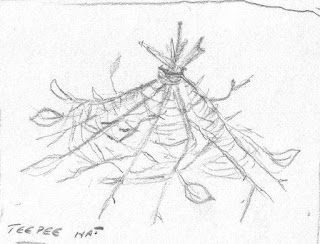The next topic on the cards for my series of posts on the impacts of magic on worldbuilding is one which is a central concern of any living creature: Food
Without food we die. Food, the Harvest, is THE driving force of most cultures. And there is no more obvious use of magic than to make sure the Harvest is bountiful.
Land's Health
Countless harvest-related magical rituals are found in our non-magical world - many of which are discussed in detail in Frazer's
The Golden Bough. Whether "country-wide" or covering a single valley, magic has long been called on to balance an ecosystem. Water, when and where needed, in the right amounts. Sunshine, not too harsh. Insects of the right sort - bees - and not those which scour and devour - locusts.
The timely sacrifice of an animal - or person - to ensure the harvest is no longer common practice. Nor do we attempt to bind the health of a country up in the body of an individual ruler (to be cosseted or killed as custom dictates). Since we already had societies built up around the belief that these rituals worked, would it be a tangibly different world if the rituals had a true impact?
Failure to Kill
When sacrifice is not a matter of belief but a necessary component of harvest, then failure to sacrifice will result in an obviously linked failure of harvest.
How hungry is the land? Does it require the sacrifice of animals, of maidens, of kings? How would you feel as this year/month/week's designated sacrifice, knowing that if you run, if you escape, the harvest will fail? The rivers will dry? The rains will not come?
And if you're the executioner? The person with the grim, horrible duty to take life in order to preserve it? Are you the one who chooses who dies? Do you choose people with family, who will perhaps be more willing to die to ensure others eat? Or do you opt for the unwanted, in hopes that you're less hated by the living?
The important thing to remember is that these are not optional acts. There will have been occasions in the past when the chosen sacrifice has not been delivered, and the consequences have been catastrophic. What kind of society will be built up around the necessity of death? Will it be one of fear and distrust, dominated by who chooses? Will it be random choice? Could it be considered an honour? Could people actually compete to be the one who dies so others live?
Worse still, will there be pressure to sacrifice more, hoping to bring about a better harvest? Where lives are being spent not to prevent hunger, but to gain wealth? The social dynamic of a world tied to a sacrifice harvest are never likely to be pretty.
Failure to Protect
The inversion of the sacrifice model is the investment of the health of the land in the body of an individual/ruler. Although these are sometimes also killed (particularly when they age and health begins to break down), the impetus here is to ensure absolute protection.
This, of course, can lead to protecting the invested person from life. High walls, seclusion, strictures on what can be touched, what can be eaten, what can be done.
In a world where the virtue of the land is invested in an individual, you could starve a kingdom with a single assassination. But, though this is one of my favourite tropes and I use it in a serious way, I often think of the story which could be written if it was used comedically.
Instead of killing the invested individual, how much more entertaining to mess with their diet? An invested Queen with a love of super-spicy curry could lead to extra-tasty cheese. But what about too many prunes? An excess of stodge? What would happen to the harvest if the focus of all the land's virtues had chicken pox? Acne? Gas?
Assisted Husbandry
Instead of the large amount of magic and risk involved with bonding lives with the land's health, a more practical use for magic is to simply refine agriculture. Divinations could give understanding of the intricacies of crop rotation, or track down the best way to combat pests. Special forges could produce high-quality ploughs. Jobbing magicians would provide wards against wolves or charm goats to eat only the weeds while leaving the crops. And then there's Shaping.
Shaping is an invention of mine, changing the nature of something "beyond the blood" - in other words, genetic manipulation in a fantasy setting, which is the basis of the Fair in the world of
Champion of the Rose. The Fair trade their genetically modified plants, and gave as a gift a modified form of a grain-crop which was so productive and resistant to diseases and pests that it dramatically increased general quality of life world-wide.
The advantage of Shaping is that the need for magic, for the involvement of mages, is only at the creation. After that you have a plant or animal which can be spread and reproduced without further input from the mage.
Of course, in the grand tradition of almost every story about genetic manipulation, Shaping has a tendency to Go Wrong.
Preservation
In addition to producing food, one of the largest challenges of the pre-industrial world was preserving that food. Salt, honey and cloves were valuable not only for their taste benefits, but for their ability to extend the Use By date of the harvest.
An obvious use for magic is refrigeration (and gives me some grand images of icicle-encrusted cargo ships floating down steamy tropical rivers) and just as the village baker's oven was once put to the use of entire villages, it's easy to picture a communal enchanted icehouse where food is preserved.
Preservation leads to a more stable food supply, rather than feast and famine cycles, and portable refrigeration allows for a greater variety of food. If, that is, your world didn't already have a system of portals making world-wide trade quicker and easier than anything science can currently provide. Your pleasure-loving ruler might regularly dine on a Meal of the Seasons, starting with Spring Lamb from the valley hidden between the three tallest mountains on the far side of the world.
Fantastical Food
And the Meal of the Seasons leads nicely into Fantastical Food, by which I mean food production or food which is magical. Apple Pie Trees. Gingerbread Men that try to escape. Sweets which are an entire meal in a single all-day sucker. Cornucopias are a traditional example of FF (with variants such as tablecloths which can be spread once a day for a full meal, or a handkerchief which will always give you lunch). Fountains of Youth or Love or Genderbending also fall into this area.
I'm occasionally tempted to see sneak these into my seriousmagicworlds to see whether I can maintain the tone of the Deep Moral Issues after discovering the (Lashings of) Ginger Beer Fountain.
How you use magic can completely change the tone of the world you build, and if you've included a generous dash of magic, take the time to consider how this will impact the kind of food your characters will eat, and why it doesn't always have to be Stew.

 By request of Jenny, a 796 page block of rambling teen adventure. [It started out over 900 pages, but since Lulu only does hardcovers up to 800 pages I had to reduce the font and prune the margins.]
By request of Jenny, a 796 page block of rambling teen adventure. [It started out over 900 pages, but since Lulu only does hardcovers up to 800 pages I had to reduce the font and prune the margins.]






 Ready Player One by Ernest Cline
Ready Player One by Ernest Cline